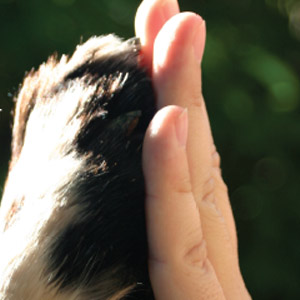 Up to 20% of military personnel returning from overseas duty are estimated to be suffering from Post Traumatic Stress Disorder. This debilitating condition causes anxiety, depression, sleeplessness, flashbacks and acute wariness. Sadly, statistics show that both the physical and emotional traumas suffered by soldiers leads to unemployment, failed or abusive relationships, addictions and apathy.
Up to 20% of military personnel returning from overseas duty are estimated to be suffering from Post Traumatic Stress Disorder. This debilitating condition causes anxiety, depression, sleeplessness, flashbacks and acute wariness. Sadly, statistics show that both the physical and emotional traumas suffered by soldiers leads to unemployment, failed or abusive relationships, addictions and apathy.
Animals can also develop PTSD, especially those that have been abused, neglected, abandoned or otherwise hurt or traumatized. Often, these animals end up in shelters, homeless and unwanted.
But it’s not all bleak, thanks to an organization called Pets For Vets (pets-for-vets.com), a non-profit organization founded in 2009 by professional dog trainer Clarissa Black. While working with therapy dogs, Clarissa saw how important animals were to recovering veterans and wounded soldiers. “The bonds of friendship formed between human and animal have the power to ease the suffering of our troops when they return from overseas,” she says. As someone who has had her own experience with PTSD, she founded Pets For Vets as a way to say thanks to the country’s heroes, and to provide both returning veterans and needy animals a second chance at life.
With regional chapters across the US, the organization addresses the needs of veterans who are not eligible for service dogs, but could benefit from having a trained companion animal. Returning military men and women who have screened positive for PTSD are eligible to put in an application on the Pets For Vets website. Once a veteran has applied, Clarissa and her team begin the process of interviewing him or her to see what he or she is looking for in a dog. They then pair a dog with the veteran’s personality and lifestyle.
Pets For Vets dogs are rescued from shelter life and trained to assimilate into a home environment. “We usually look for dogs that are past the puppy stages,” says Clarissa. “We don’t specialize in a particular size or breed; it depends on the veteran’s preference, needs and lifestyle.” Once the right dog has been chosen for a veteran, the animal spends time in the home of one of the organization’s trainers, who begins teaching him basic obedience and socialization.
“Our trainers look for temperament and sociability,” explains Clarissa. “We train according to CGC (Canine Good Citizen) standards, which include manners, obedience and socialization. Our trainers work with the dogs every day, and take them for walks, rides in the car, on runs and to the dog park.” They introduce them to the types of activities and environments they will encounter with the veterans, and tailor their training to each veteran’s needs and lifestyle, which might include foreign objects like wheelchairs and crutches. Some veterans may just want a lap dog, while others might want a dog that can keep up with their personal activity levels.
Since its inception four years ago, Pets for Vets has placed approximately 50 animals with veterans from the Vietnam War and the Afghanistan and Iraq Wars. Clarissa also extends her services and support to shelters and animal rescues, participating in events and helping raise awareness of the importance of adopting. Her ultimate goal is to have Pets for Vets chapters in all 50 states.
The organization is funded through individual and corporate donations that are tax-deductible to the fullest extent allowed by law. Donations can be made through the website and not only help save lives (both human and animal) but go towards providing the necessary equipment for “pet/vet” matches to begin their new lives together.
When asked what her favorite success story has been to date, Clarissa replies that every story is special to her. “It is incredibly rewarding to see the bonds of friendship between the veterans and their dogs, and to watch the animals work their magic.”
This article is from http://www.animalwellnessmagazine.com/articles/perfect-match/ By: As seen in: AWM Vol. 15 Issue 5
